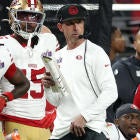
The NFL playoff overtime rules changed several years ago, but Super Bowl LVIII was the first playoff game where the new format was in effect. The basics of the new overtime rules are simple: both teams get possession of the ball no matter if a team scores a touchdown on the opening possession or not.
The Kansas City Chiefs certainly knew what was going on. The San Francisco 49ers did not. And that was the ball game: Chiefs 25, 49ers 22.
Here's a look at the striking difference in the way the two teams were prepared for a potential overtime.
49ers didn't know the new playoff rules
In the aftermath of the Chiefs' overtime Super Bowl victory, San Francisco players admitted they did not know the new overtime rules -- even though they were in place for two years.
"I guess that's not the case," 49ers fullback Kyle Juszczyk said, via The Ringer. "I don't really know the strategy."
Juszczyk thought a team that got the ball first in overtime won if they scored a touchdown, which was the rule instituted in 2010. Under those playoff overtime rules, the game would not immediately end if the team that gets the ball first scores a field goal on its first possession -- but the game would end if a touchdown is scored by the offense or if the defense scores a safety on the first possession of the overtime period.
The 49ers' Arik Armstead also admitted he wasn't aware of the new overtime rule, not knowing the other team got possession of the ball even if the team that won the coin toss -- and chose to receive -- scored a touchdown. Those were the sudden death overtime rules pre-2010.
If 49ers players were unaware of the new overtime rules, did Kyle Shanahan know? If Shanahan did know, how did he prepare for a Super Bowl that certainly had the potential to go to overtime? It was a possibility that skyrocketed after kicker Jake Moody had an extra point attempt blocked with 11:22 left in the fourth quarter, resulting in only a 3-point lead.
The 49ers decided to take the ball first in overtime, a decision made even worse since at least some of Shanahan's players did not know what the protocol was if the 49ers scored. Since both teams get possession of the ball in overtime, going first wasn't the optimum strategy.
No matter what the 49ers did, the Chiefs knew exactly what they needed when they got the ball. Yes, in case the 49ers didn't know: The Chiefs were getting the ball in overtime. Of course, by choosing to get the ball first, Shanahan wouldn't be aware of what was needed, or what the Chiefs might do.
"This is something we talked about with, you know, that none of us have a ton of experience of it but we went through all the analytics and talked with those guys and we just thought it would be better, we just wanted the ball third," Shanahan said after the game, via a league transcript. "If both teams matched and scored, we wanted to be the ones who had the chance to go in.
"We got that field goal, so we knew we had to hold them to at least a field goal. And if we did then we thought it was in our hands after that."
The 49ers clearly showed a lack of awareness. With the Niners' field goal, the Chiefs knew they needed a touchdown to win the Super Bowl. Even if the 49ers had scored a touchdown, the pressure would've been on them to choose between kicking the extra point or attempting a two-point conversion.
In fact, the only way the 49ers benefitted from choosing to get the ball first would've been by scoring a touchdown and then converting the two-point attempt. Anything else? Advantage, Chiefs.
Chiefs talked playoff OT strategy with analytics coordinator
Kansas City was certainly prepared for the new overtime rules, as head coach Andy Reid kept discussing the rules with his team throughout the playoffs. He knew the possibility of an overtime game was always on the table.
How did Reid know what to do if the Chiefs had won the coin toss? Reid trusted Mike Frazier, who has been with Reid all 11 seasons in Kansas City as the Statistical Analysis Coordinator. Frazier had the same role with the Philadelphia Eagles from 2003 to 2012 -- also with Reid.
"That's the value of Mike. He does a great job with that," Reid said, via a league transcript. "There's two ways you can go with it. You can either kick it off or you can receive it. I'm not sure there's a right answer necessarily. Ours ended up being the right one.
"That easily could have gone the other way. That's what we felt was the right thing to do...That was just something that we chose throughout studies. We felt that was important."
The Chiefs wanted the ball second. The 49ers wanted the ball third (if that was a possibility).
Clearly the 49ers made a mistake once they failed to get into the end zone. With Patrick Mahomes on the opposite sideline, the 49ers should have put the pressure on him to score a touchdown first (and Reid to make a decision whether to go for two afterwards).
Of course, this would have been avoided if San Francisco knew the rules. Neither the players -- nor the head coach -- were aware of the situation.
And that was the ball game.
















